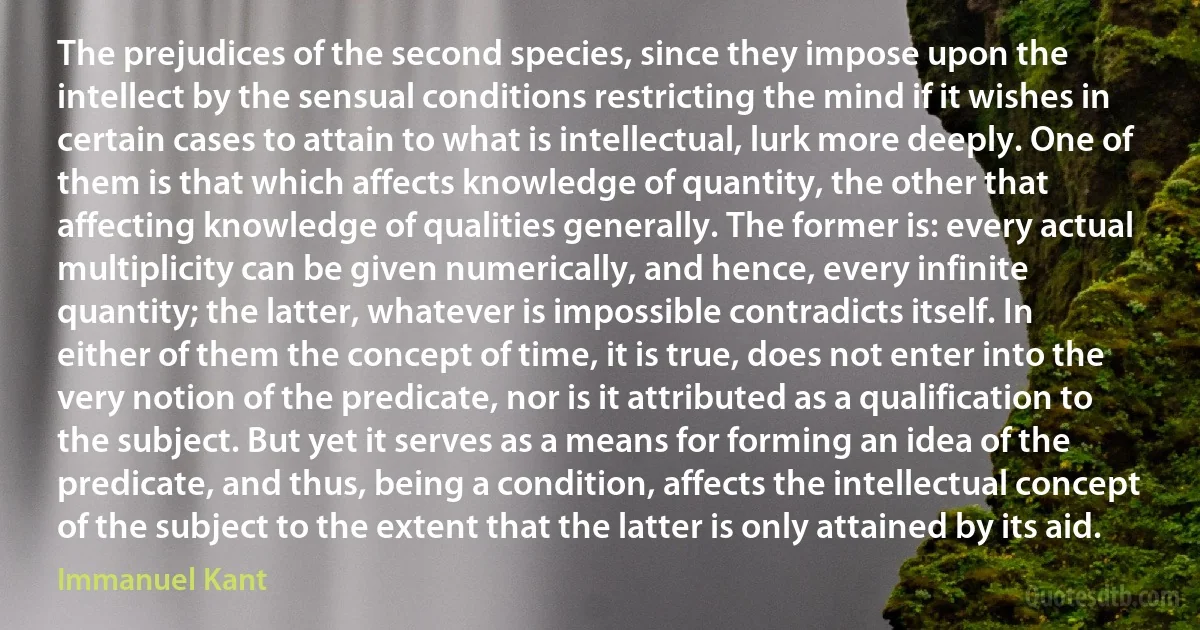
The prejudices of the second species, since they impose upon the intellect by the sensual conditions restricting the mind if it wishes in certain cases to attain to what is intellectual, lurk more deeply. One of them is that which affects knowledge of quantity, the other that affecting knowledge of qualities generally. The former is: every actual multiplicity can be given numerically, and hence, every infinite quantity; the latter, whatever is impossible contradicts itself. In either of them the concept of time, it is true, does not enter into the very notion of the predicate, nor is it attributed as a qualification to the subject. But yet it serves as a means for forming an idea of the predicate, and thus, being a condition, affects the intellectual concept of the subject to the extent that the latter is only attained by its aid.
Immanuel KantRelated topics
certain concept condition enter forming given idea impose impossible intellectual knowledge mind multiplicity nor predicate qualification second thus time whatever yet meansRelated quotes
The portion of the materia prima which is... is endowed with the intellectual faculty, possesses a special property by which each individual, according to the degree of his perfection, is enabled to manage, to calculate, and to discover what is conducive both to the temporary existence of the individual and to the preservation of the species. All other movements... by the individual members of the species are due to accident; they are not, according to Aristotle, the result of rule and management... Aristotle sees no difference between the falling of a leaf or a stone and the death of the good and noble people in the ship; nor does he distinguish between the destruction of a multitude of ants by an ox depositing on them his excrement and the death of worshippers killed by the fall of the house when its foundations give way.

Maimonides
For to those who have not the means within themselves of a virtuous and happy life every age is burdensome; and, on the other hand, to those who seek all good from themselves nothing can seem evil that the laws of nature inevitably impose. To this class old age especially belongs, which all men wish to attain and yet reproach when attained; such is the inconsistency and perversity of Folly! They say that it stole upon them faster than they had expected. In the first place, who has forced them to form a mistaken judgement? For how much more rapidly does old age steal upon youth than youth upon childhood? And again, how much less burdensome would old age be to them if they were in their eight hundredth rather than in their eightieth year? In fact, no lapse of time, however long, once it had slipped away, could solace or soothe a foolish old age.

Cicero
...what would be most extraordinary is this, that anybody who considered the state of the Liberal party then [1896] and now should expect me voluntarily to return to the Liberal party. (Laughter.) I left the Liberal party because I found it impossible to lead it, in the main owing to the divisions to which I referred in my letter. (Hear, hear.) The Liberal party in that respect is no better now, but rather worse; and it would indeed be an extraordinary evolution of mind if, after having left the Liberal party on that ground, I were to announce my intention of voluntarily returning to it in its present condition. No, gentlemen, so far as I am concerned, I must repeat what I have said on that subject in all my speeches, that for the present, at any rate, I must proceed alone. I must plough my furrow alone.

Archibald Primrose, 5th Earl of Rosebery
Justice is the end of government. It is the end of civil society. It ever has been, and ever will be, pursued, until it be obtained, or until liberty be lost in the pursuit. In a society, under the forms of which the stronger faction can readily unite and oppress the weaker, anarchy may as truly be said to reign, as in a state of nature where the weaker individual is not secured against the violence of the stronger: And as in the latter state even the stronger individuals are prompted by the uncertainty of their condition, to submit to a government which may protect the weak, as well as themselves: so in the former state, will the more powerful factions be gradually induced by a like motive, to wish for a government which will protect all parties, the weaker as well as the more powerful.

Alexander Hamilton
I gave up on this stuff. I gave up on my species and ... I gave up on my countrymen. Because I think we squandered great gifts. I think humans were given great great gifts: walking upright, binocular vision, opposable thumb, large brain ... We grew. We had great gifts, and we gave it all up for both money and God ... We gave it all up to superstition, primitive superstition, primitive shit ... Invisible man in the sky, looking down, keeping track of what we do, make sure we don't do the wrong thing, if we do, he puts us in hell, where we burn forever. That kind of shit is very limiting for this brain we have. So we keep ourselves limited. And then we want a toy and a gizmo and gold and we want shiny things, and we want something to plug in that will make big big big things for us... And all that shit is nothing! It's nothing.

George Carlin
